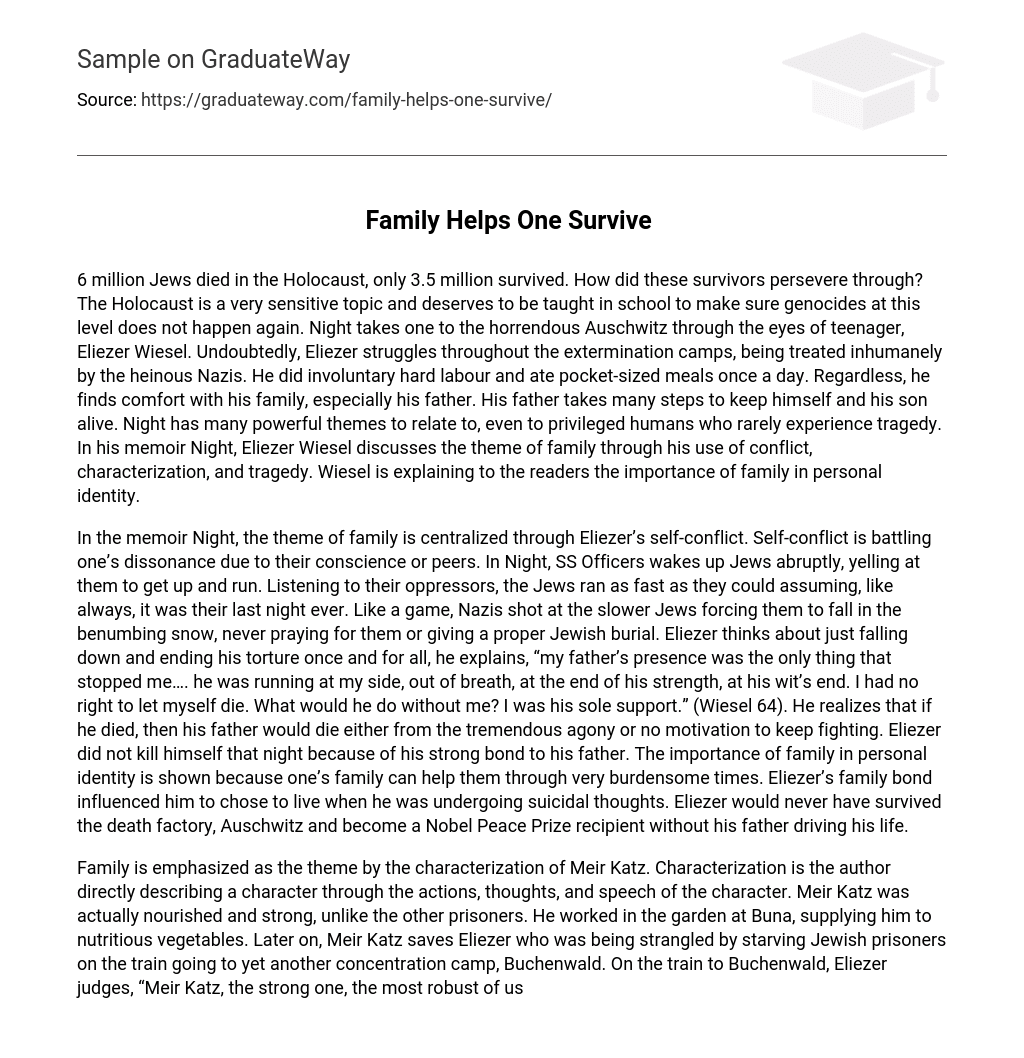6 million Jews died in the Holocaust, only 3.5 million survived. How did these survivors persevere through? The Holocaust is a very sensitive topic and deserves to be taught in school to make sure genocides at this level does not happen again. Night takes one to the horrendous Auschwitz through the eyes of teenager, Eliezer Wiesel. Undoubtedly, Eliezer struggles throughout the extermination camps, being treated inhumanely by the heinous Nazis. He did involuntary hard labour and ate pocket-sized meals once a day. Regardless, he finds comfort with his family, especially his father. His father takes many steps to keep himself and his son alive. Night has many powerful themes to relate to, even to privileged humans who rarely experience tragedy. In his memoir Night, Eliezer Wiesel discusses the theme of family through his use of conflict, characterization, and tragedy. Wiesel is explaining to the readers the importance of family in personal identity.
In the memoir Night, the theme of family is centralized through Eliezer’s self-conflict. Self-conflict is battling one’s dissonance due to their conscience or peers. In Night, SS Officers wakes up Jews abruptly, yelling at them to get up and run. Listening to their oppressors, the Jews ran as fast as they could assuming, like always, it was their last night ever. Like a game, Nazis shot at the slower Jews forcing them to fall in the benumbing snow, never praying for them or giving a proper Jewish burial. Eliezer thinks about just falling down and ending his torture once and for all, he explains, “my father’s presence was the only thing that stopped me…. he was running at my side, out of breath, at the end of his strength, at his wit’s end. I had no right to let myself die. What would he do without me? I was his sole support.” (Wiesel 64). He realizes that if he died, then his father would die either from the tremendous agony or no motivation to keep fighting. Eliezer did not kill himself that night because of his strong bond to his father. The importance of family in personal identity is shown because one’s family can help them through very burdensome times. Eliezer’s family bond influenced him to chose to live when he was undergoing suicidal thoughts. Eliezer would never have survived the death factory, Auschwitz and become a Nobel Peace Prize recipient without his father driving his life.
Family is emphasized as the theme by the characterization of Meir Katz. Characterization is the author directly describing a character through the actions, thoughts, and speech of the character. Meir Katz was actually nourished and strong, unlike the other prisoners. He worked in the garden at Buna, supplying him to nutritious vegetables. Later on, Meir Katz saves Eliezer who was being strangled by starving Jewish prisoners on the train going to yet another concentration camp, Buchenwald. On the train to Buchenwald, Eliezer judges, “Meir Katz, the strong one, the most robust of us all, wept. His son had been taken from him… He was finished, at the end of his tether” (Wiesel 75). The reader comprehends how it does not matter how strong you are physically, losing your family is a huge toll on a person mentally. Even the prosperous and capable Meir Katz passed away because he lost his son. By merely the strong bond to his son, he has forced him to end his torment. Meir Katz embodies the theme of the importance of family in personal identity perfectly because his family defines him. Once he loses his definition, his purpose for life, he ends it.
Tragedy exhibits the importance of family in personal identity with Father Wiesel. The tragedy in Night is a major devastation in a story filled with barbaric events. Eliezer analyzes how important his father is to him throughout the entire memoir. Eliezer’s father before the camps was a very respected member of society and was seated on the Jewish Council. Months into the camps, his father soon becomes quite ill. One night, Eliezer’s father is moaning, having delusions, and calling out to Eliezer. Taking care of his father all day, Eliezer chooses to sleep and ignore his father. Eliezer narrates saying, “ I awoke on January 29 at dawn. In my father’s place lay another invalid. They must have taken him away before dawn and carried him to the crematory. He may still have been breathing. There were no prayers at his grave. No candles were lit to his memory. His last word was my name. A summons, to which I did not respond” (Wiesel 81). This quote shows Eliezer’s feelings toward his father’s death in the diction he uses. He uses short, direct sentences to not show emotion because he suppresses his father’s death till he is much older. He suppresses his father’s death because he knows that if he grieves properly and acknowledges the death then he will lose his drive to life and may kill himself. Their strong father-son bond helped them both through the extermination camps. Their family bond demonstrates such importance that Eliezer ended his memoir when his father died because his drive to live also ended with his father’s death.
“Family is not an important thing. It’s everything”, perfectly said by Michael J. Fox. Through conflict, characterization, and tragedy, one understands the importance of family in personal identity in Wiesel’s memoir, Night. Family may not be blood-related but the strong bonds and experiences together drive dependability, love, and compassion. Family bonds are shown through Wiesel’s self-conflict, Meir Katz’s characterization, and Wiesel’s personal tragedy. Is ones family just as important to them like the Jew’s in the Holocaust, make sure it is.





